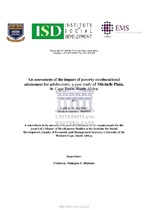| dc.contributor.advisor | Dinbabo, Mulugeta F. | |
| dc.contributor.author | Gardiner, Carlene M. | |
| dc.date.accessioned | 2020-02-18T10:24:57Z | |
| dc.date.available | 2020-02-18T10:24:57Z | |
| dc.date.issued | 2019 | |
| dc.identifier.uri | http://hdl.handle.net/11394/7120 | |
| dc.description | Magister Artium (Development Studies) - MA(DVS) | en_US |
| dc.description.abstract | South Africa is unfortunately regarded as one of the most unequal countries in the world. Poverty is rife within the communities and it affects various aspects of individuals’ lives, including education. Education is a fundamental human right, however after twenty-five years as a democratic country, inequalities still exist within the education system of South Africa. Many will argue that these inequalities can be attributed to poverty. Poverty and education have an ongoing love-hate relationship. This is due to the fact that often the key to escaping poverty is through education, however South Africa’s education system is failing the poor. Thus, creating the love-hate relationship between the two and, establishing a poverty trap that is difficult to escape. However, access to education alone cannot break the poverty cycle, an individual requires access to quality education. Accordingly, this research study seeks to investigate the relationship between poverty and educational attainment for high school learners in Mitchells Plain. | en_US |
| dc.language.iso | en | en_US |
| dc.publisher | University of the Western Cape | en_US |
| dc.subject | Poverty | en_US |
| dc.subject | Education | en_US |
| dc.subject | South Africa | en_US |
| dc.subject | Inequality | en_US |
| dc.subject | Mitchells Plain | en_US |
| dc.title | An assessment of the impact of poverty on educational attainment for adolescents: a case study of Mitchells Plain, in Cape Town, South Africa | en_US |
| dc.rights.holder | University of the Western Cape | en_US |

